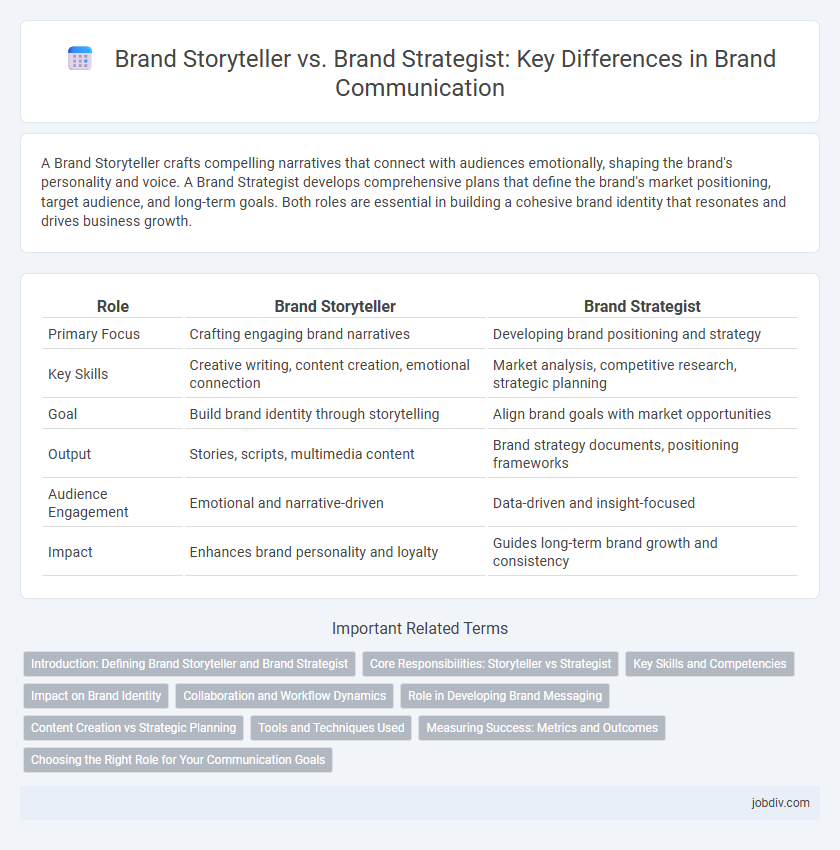A Brand Storyteller crafts compelling narratives that connect with audiences emotionally, shaping the brand's personality and voice. A Brand Strategist develops comprehensive plans that define the brand's market positioning, target audience, and long-term goals. Both roles are essential in building a cohesive brand identity that resonates and drives business growth.
Table of Comparison
| Role | Brand Storyteller | Brand Strategist |
|---|---|---|
| Primary Focus | Crafting engaging brand narratives | Developing brand positioning and strategy |
| Key Skills | Creative writing, content creation, emotional connection | Market analysis, competitive research, strategic planning |
| Goal | Build brand identity through storytelling | Align brand goals with market opportunities |
| Output | Stories, scripts, multimedia content | Brand strategy documents, positioning frameworks |
| Audience Engagement | Emotional and narrative-driven | Data-driven and insight-focused |
| Impact | Enhances brand personality and loyalty | Guides long-term brand growth and consistency |
Introduction: Defining Brand Storyteller and Brand Strategist
A Brand Storyteller crafts compelling narratives that connect emotionally with the audience, emphasizing the brand's values and personality through engaging content. A Brand Strategist focuses on developing comprehensive plans that align market research, positioning, and messaging to achieve long-term business goals. Both roles are essential in communication, where storytelling builds brand identity while strategy ensures cohesive and targeted brand growth.
Core Responsibilities: Storyteller vs Strategist
A Brand Storyteller crafts compelling narratives that humanize the brand, engaging audiences through emotional connection and consistent messaging across channels. A Brand Strategist develops comprehensive plans that define the brand's positioning, target market, competitive analysis, and long-term growth objectives to drive business success. While the storyteller focuses on content creation and authentic engagement, the strategist ensures alignment with overall brand goals and market trends.
Key Skills and Competencies
Brand storytellers excel in creative narrative development, emotional engagement, and content creation, crafting compelling stories that resonate with target audiences and build brand identity. Brand strategists specialize in market analysis, competitive positioning, and long-term planning, utilizing data-driven insights to align brand messaging with business objectives and drive market growth. Both roles require strong communication skills, but brand storytellers prioritize creativity and empathy, while brand strategists emphasize strategic thinking and analytical abilities.
Impact on Brand Identity
A Brand Storyteller crafts compelling narratives that humanize the brand, fostering emotional connections and enhancing consumer loyalty. A Brand Strategist defines the brand's core values, positioning, and messaging frameworks, ensuring consistency and clarity across all touchpoints. Together, they shape a cohesive brand identity that drives engagement and differentiates the brand in competitive markets.
Collaboration and Workflow Dynamics
Brand storytellers craft compelling narratives that resonate emotionally with audiences, while brand strategists develop data-driven plans that align messaging with business goals. Their collaboration enhances workflow dynamics by integrating creative storytelling with strategic frameworks, ensuring consistent brand identity across all channels. Effective communication between these roles streamlines campaign execution, optimizes resource allocation, and drives cohesive brand experiences.
Role in Developing Brand Messaging
A Brand Storyteller crafts compelling narratives that humanize the brand, making it relatable and memorable to the target audience. A Brand Strategist analyzes market trends, audience insights, and competitive positioning to create a coherent messaging framework that supports long-term brand goals. Together, their collaboration ensures that brand messaging is both emotionally engaging and strategically aligned for maximum impact.
Content Creation vs Strategic Planning
A Brand Storyteller excels in content creation by crafting compelling narratives that resonate emotionally with the target audience, enhancing brand engagement through authentic storytelling. In contrast, a Brand Strategist focuses on strategic planning by analyzing market trends, defining brand positioning, and aligning long-term business goals with marketing initiatives. Effective brand communication requires integrating storytelling skills with strategic insights to build a cohesive and impactful brand identity.
Tools and Techniques Used
Brand storytellers utilize creative tools such as narrative frameworks, multimedia content platforms, and emotional appeal techniques to craft compelling and relatable brand narratives that engage audiences deeply. Brand strategists employ analytical tools like market research software, consumer behavior analytics, and competitive benchmarking to develop data-driven strategies that align brand positioning with business goals. Both roles integrate digital tools for social media management and content optimization to enhance brand visibility and consistency across channels.
Measuring Success: Metrics and Outcomes
Brand storytellers measure success through audience engagement metrics such as emotional resonance, narrative reach, and content shareability, emphasizing the impact of stories on brand perception. Brand strategists focus on data-driven outcomes including market share growth, customer acquisition rates, and return on investment (ROI) to evaluate overall business performance. Both roles leverage qualitative and quantitative metrics but prioritize different indicators aligned with storytelling impact versus strategic business objectives.
Choosing the Right Role for Your Communication Goals
A Brand Storyteller crafts compelling narratives that evoke emotions and create personal connections, making them ideal for enhancing brand identity and customer engagement. A Brand Strategist develops comprehensive plans based on market analysis and consumer insights to position the brand effectively and drive long-term growth. Selecting between these roles depends on your communication goals: prioritize storytelling to build emotional resonance or strategic planning to achieve measurable business objectives.
Brand Storyteller vs Brand Strategist Infographic

 jobdiv.com
jobdiv.com